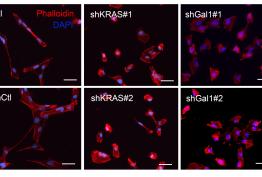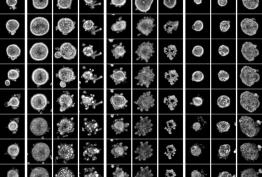A team of researchers from the Hospital del Mar Medical Research Institute (IMIM-Hospital del Mar) and the IIBB-CSIC-IDIBAPS have identified a new biomarker for early diagnosis of the most common pancreatic cancer, pancreatic ductal adenocarcinoma, which represents the third cause of death from cancer in developed countries (nearly 8,700 cases were registered in Spain in 2021).
This work, published in the journal eBioMedicine, of The Lancet group, associates the presence of the protein tyrosine kinase AXL with the detection of this type of tumor. This discovery represents a great advance because it allows detection through a blood test and because, until now, there was no biomarker for the early detection of pancreatic cancer.
This new marker represents a great innovation in the detection of a type of cancer for which there is no early diagnosis biomarker. Currently, “CA19-9 protein is used only to assess response to treatment, but cannot be used for diagnosis because of its low specificity. For this reason, having a new tool is of special relevance, especially considering that early diagnosis is essential for tumor surgery, the only curative treatment option”, highlights Laura Visa, doctor in the Medical Oncology Service of the Hospital del Mar.
The study has analyzed the usefulness of the receptor tyrosine-kinase AXL, a protein present on the surface of cells, to detect the presence of pancreatic cancer. This protein is usually absent in normal cells, but its presence has been shown to be markedly increased in certain types of tumors, such as pancreatic.
“The AXL protein is a specific marker that tells us that there are already malignant cells. The fact that this marker is linked to the cell in the tumor stage gives it great importance due to its specificity in diagnosing pancreatic cancer”, says Pilar Navarro, a researcher at the IIBB-CSIC and the IMIM-Hospital del Mar.
To demonstrate the diagnostic utility of this marker using a blood test, the researchers analyzed samples from more than 200 patients with chronic pancreatitis and pancreatic tumors. "In this way, the presence of the soluble AXL protein in blood was demonstrated as a marker in patients who had already developed the tumor, without being present in healthy individuals or in those suffering from chronic pancreatitis", emphasize Neus Martínez-Bosch, researcher from the IMIM-Hospital del Mar and Helena Cristóbal, from the IIBB (CSIC-IDIBAPS), co-first signatories of the work.
This conclusion makes it possible to advance in the detection of pancreatic cancer by identifying the tumor even in patients with pancreatitis, a pathology that can make diagnosis difficult. Thus, a new diagnostic marker is obtained, a very valuable tool, since the scarcity of markers means that only 20% of patients can be operated on time, promoting metastasis and resistance to treatment.
Application for diagnosis
The future of the study is related to the analysis of patients who may benefit from this new marker, since a small number of pancreatic tumors do not express the AXL protein. The combination of the analysis of both proteins, CA19-9 and AXL, determines the presence of cancer cells with a sensitivity of 90 percent. "We are very interested in knowing why some cancers do not express AXL, this could give us clues to know how the tumor mechanisms work that we could use as targets for treatments", concludes Pablo García de Frutos, researcher at the IIBB (CSIC-IDIBAPS).
Reference Article
Neus Martínez-Bosch*, Helena Cristóbal*, Mar Iglesias, Meritxell Gironella, Luis Barranco, Laura Visa, Domenico Calafato, Silvia Jiménez-Parrado, Julie Earl, Alfredo Carrato, Noemí Manero-Rupérez, Mireia Moreno, Albert Morales, Carmen Guerra, Pilar Navarro*, Pablo García de Frutos*. Soluble AXL is a novel blood marker for early detection of pancreatic ductal adenocarcinoma and differential diagnosis from chronic pancreatitis,
eBioMedicine, Volume 75, 2022, 103797, ISSN 2352-3964,






